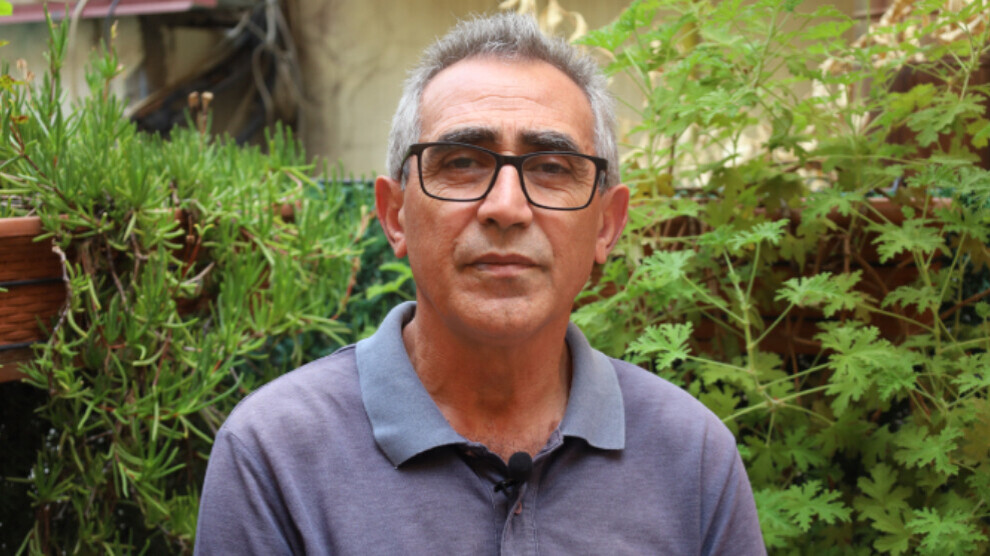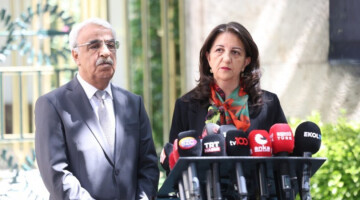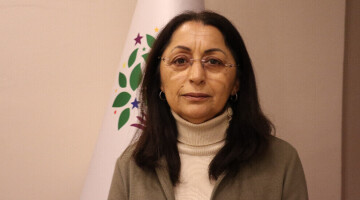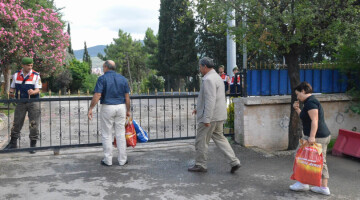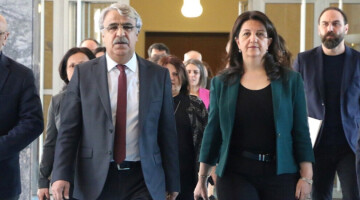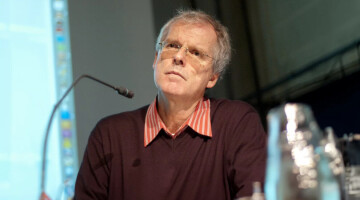Turkey entered a new phase of political discussion following the call made by Abdullah Öcalan on 27 February. After Öcalan’s statement regarding the dissolution of the Kurdistan Workers’ Party (PKK), there was growing public backlash against the government’s stalling tactics. In the midst of this political climate, President Recep Tayyip Erdoğan orchestrated an operation targeting his strongest rival, Istanbul Metropolitan Municipality Mayor Ekrem İmamoğlu, along with 11 others, under the pretext of the 'Urban Consensus' and alleged 'corruption.' As a result, the mayor of Turkey’s largest metropolitan city was arrested.
The protests that erupted following Imamoğlu’s detention revealed that public anger towards the ruling Justice and Development Party (AKP) runs deeper than it may appear. Demonstrations spread across the country, leading to the detention of thousands and the arrest of hundreds, including many university students. Nevertheless, the protests have not ceased.
Mevlüt Aykoç, co-spokesperson of the Marmara Region for the Democratic Regions Party (DBP), spoke to ANF about the recent developments in Turkey and the situation that has unfolded since Abdullah Öcalan’s 27 February call.
Dictators never want an alternative to themselves
Mevlüt Aykoç noted that the Republican People’s Party (CHP) has become the country’s leading political force with the support of the people and added: “Although the operation targeting Imamoğlu is being framed around two narratives, one being the Urban Consensus and the other allegations of corruption, the real target is something else. What is actually being attacked is the fact that Kurds, particularly in metropolitan areas, are collaborating with individuals who hold different views, engaging in joint municipal efforts in the west on a democratic basis and forming local alliances.
Every political party engages in such alliances. The AKP’s collaboration with the Nationalist Movement Party (MHP) and other parties is their own form of consensus. The Urban Consensus refers to the idea of different identities and social groups in a city coming together on common ground to co-govern the city. This is a concept that has become a lived reality in many parts of the world.
The operation against Imamoğlu should also be understood within this broader context. While some assess Imamoğlu as an alternative to Tayyip Erdoğan, I believe the Imamoğlu process should be viewed more broadly, as the leadership of the largest municipality where all peoples have found common ground. If you ask, ‘Why was this not framed through the Urban Consensus?’ it is true that Imamoglu was not deeply engaged in dialogue with the Urban Consensus initiative. However, there are other mayors who have been arrested within the scope of the Urban Consensus, people who truly embraced and practiced this spirit of cooperation.’’
It is also important to underline this: dictatorship is a particular concept, and history has seen many dictators. What all dictators have in common is that they never want any alternative to themselves, and we must be conscious of that. In this case, Imamoğlu is emerging as such an alternative. Even though the core issue here is Kurdish participation in governance in the metropolises, another key dimension is the threat that Imamoğlu represents as a political alternative.”
CHP must trust the power of the people
Aykoç stated that the mindset behind government-appointed trustees has its roots in the Ottoman era and added: “We have always said this: the concept of trusteeship is not new. It dates back to the Ottoman Empire. Back then, the Ottomans made this practice a reality by appointing pashas over Kurdish principalities. In the years that followed, they continued this policy by shutting down our associations and political parties and replacing them with appointed figures. Especially over the last three terms, this approach has become a direct intervention in the will of the people, as they seized control of our municipalities and attempted to impose their power there as well.
For years, we have been saying this: ‘If you do not speak out against the injustices, the violations of law, and the wrongdoings in this country, then one day these injustices will come for you as well.’ And indeed, wherever injustice sees its opponent, it will strike.
It must be said clearly: the CHP, having risen to its current position of strength through the support of the people, must now turn toward the people and begin to place its trust in their power. What has happened to Imamoğlu stems from a failure to trust the people. Had they trusted the people in Esenyurt and not tried to prevent them from taking to the streets, these operations might never have happened.”
We do not accept attitudes that ignore or humiliate Kurdish children
Aykoç emphasized that there is a nationalist wing within the CHP that does not support a democratic resolution and shared his thoughts on recent statements made by Mansur Yavaş: “It must be stated clearly: one should look at the past of the person making such remarks. There is a saying: ‘The body may change, but the character does not.’ No matter how much we may think that people evolve over time or change due to the positions they hold, some do not. This person has not changed either. He has been shaped by anti-Kurdish sentiment. He is someone who has stood for years against Kurds, against democrats, against the left, and against socialists. To place such a person in a democratic context is a mistake. Within the CHP, there is a wing shaped by the mindset of the nation-state. The individual in question is part of a structure that draws its support from that nationalist wing.
Our experience in this struggle has made it clear: we reject racism, the denial of an entire people, and the erasure of identity. That flag, which refers to a Kurdish symbol, has been recognized in the constitution. Under that flag, both a prime minister and a president have delivered speeches in this country. Even if something is not officially recognized in the legal framework of a state, if a people see it as a symbol of their own will, it must be respected. If a people adopt a flag or symbol as a representation of their identity, you are obliged to respect it.
We openly and firmly reject this individual’s stance on the matter. We do not accept this attitude that ignores Kurdish children and humiliates them. They claim to support the people of Palestine, but where are they when it comes to Kurdish children? We have always stood in solidarity with all beliefs and all struggles, and we will continue to do so.”
CHP stands at a historic crossroads
Aykoç said that both Turkey and the CHP are standing at a historical crossroads and emphasized that the party must now make a decision: “Turkey has come to a turning point, both economically and politically. We used to say this before, but now it has become a widely shared observation. Not even the thickest layer of mud can cover it up anymore. Given this situation, the CHP must make a choice. As the founding party of the Republic, will it remain stuck in the 1900s, or will it renew itself according to the changing realities of the present? It needs to decide.
Our position is clear: any political structure that does not take part in this process and contributes to a democratic solution is bound to collapse. If the CHP chooses to be part of this process and adopts a stance that defends rights and justice in the name of advancing a democratic path, it will become a powerful political force. But if it continues to act with a ‘one flag, one nation’ mentality, it will enter a period of decline.
The stance taken at Saraçhane marked an important moment.It showed that people are trying to express their opposition to the anti-democratic practices in this country. Saraçhane was a reflection of people’s emotions. It is necessary to pave the way for such expressions. Although the government is trying to portray these acts as unlawful, they are in fact one of the most legitimate rights of the people. The young people who took to the streets were not there to engage in violence or destruction. They went out to express their concerns. That is how this must be understood. At the end of the day, we are human, and we must find ways to express our reactions.”
We must uphold rights and justice as a whole
Aykoç also commented on the recent remarks made by MHP leader Devlet Bahçeli during the Eid holiday, noting that although the statements included hints of a desire for resolution, they were contradicted by ongoing repression against other communities. Aykoç continued: “We can see signs of a willingness to move toward a solution in Bahçeli’s statements. These are important and meaningful. There does seem to be an effort, but we do not know how far that effort will go. What must be emphasized is this: while speaking of resolving one issue, taking a harsh and repressive stance against another group in society who are simply defending their rights is a contradiction.
In the end, rights and justice are universal values. The Kurdish issue is not only about democratization, it also includes matters related to women, education, and many other areas. If you claim to uphold justice and the rule of law, you cannot focus on just one issue. A single-point solution cannot resolve everything. The university students who take to the streets must also be acknowledged. There can be no such thing as a one-sided solution.”
The peoples of Turkey can support the process
Aykoç emphasized that it is natural for the Kurdish people to feel moments of despair, given the pressures and the reality of a fifty-year war. Despite this, he said, the Kurdish people continue to fill Newroz squares and show their full support for the democratic process. Aykoç noted that the Turkish public remains confused—not because they are indifferent, but because of the long-standing special war waged across the country for the past five decades.
He also added that “the Kurdish people, by their very nature, have lived through a conflict-ridden process for more than fifty years, and due to the pressure they have endured, there is always a sense of hesitation. In such long-term struggles, periods of despair are inevitable. This sense of hopelessness has developed over time, but it does not mean that people oppose the process or have moved away from it. If that were the case, the Newroz squares would not be so full. Just the Newroz in Istanbul alone had two to three times the crowd compared to recent years. You cannot bring such large crowds to a Newroz celebration from nine in the morning until five in the evening unless they believe in something. The people’s presence is a declaration of their support for the process.
In reality, it is the Turkish people who are confused. After fifty years of a special war policy, it is unrealistic to expect them to have a clear and rational perspective on these issues. But if we look at where this conflict has brought Turkey, we can see that the devastation it has caused is pushing people to think more deeply. There is a genuine desire among the people of Turkey to end anti-democratic practices. If the process is explained properly, the people of Turkey can quickly evolve and embrace this democratic path. In previous phases, we saw more resistance; today, we do not see the same level of backlash. Even if there is some confusion, there is no overwhelming opposition. We always say this: when tpeoples struggle together, they will win. We are not asking anyone for rights or justice, we will win them through our struggle.”

